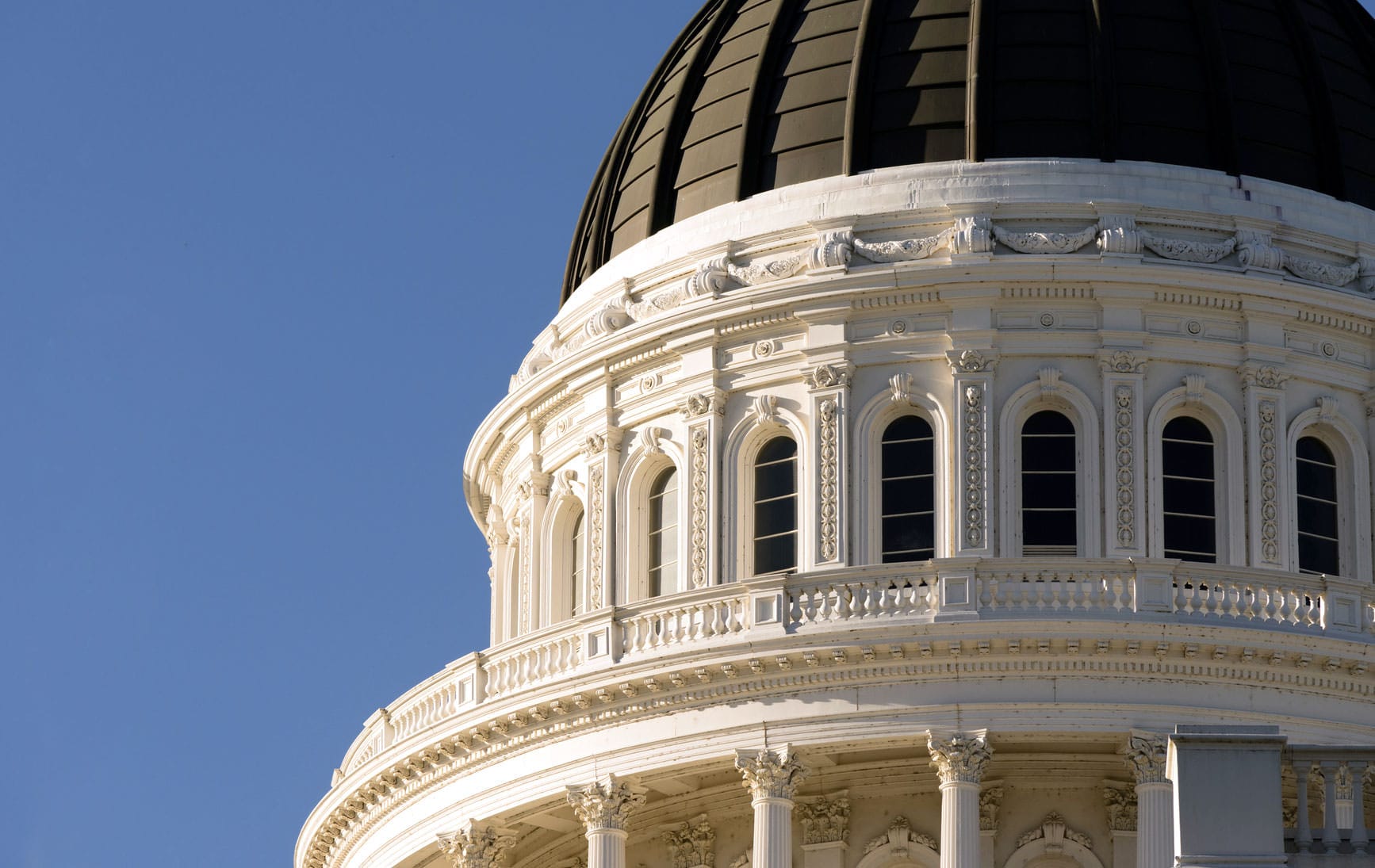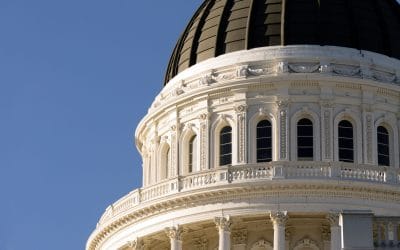Temporary Changes to Brown Act teleconference requirements signed into law. During the pandemic, it became impossible for legislative bodies governed by the Brown Act to adhere to the so- called “traditional rules” of teleconferencing, which require that each teleconferenced meeting location be publicly posted, agendas be posted at each location, and the public be granted access to each teleconference location. Understandably, members weren’t too keen on having their private addresses publicized. AB 361 (Rivas) from 2021 waived certain requirements pertaining to those traditional rules, though it only applied during a declared state of emergency and has a sunset date of January 1, 2024. AB 361 provisions can still be utilized during a proclaimed state of emergency, including the one we’re under now for COVID-19, which the Administration has said it plans to end on February 28, 2023. However, if at least a quorum of members of the legislative body are attending the meeting in person from a single physical location, AB 2449, by Assembly Member Blanca Rubio (D-Baldwin Park), permits those traditional rules to be waived if other members participate via teleconference due to “just cause” or “emergency circumstances.”
The bill provides the following definitions:
- “Emergency circumstances” means a physical or family medical emergency that prevents a member from attending in person
- Just cause” means any of the following:
- A childcare or caregiving need of a child, parent, grandparent, grandchild, sibling, spouse, or domestic partner that requires them to participate remotely.
- A contagious illness that prevents a member from attending in person.
- A need related to a physical or mental disability.
- Travel while on official business of the legislative body or another state or local agency.
If participating remotely due to just cause, the member must notify the legislative body at the earliest opportunity possible, including at the start of a regular meeting, of their need to participate remotely, and provide a general description of the circumstances relating to their need to appear remotely. The just clause provision can’t be used by any member more than twice in a calendar year.
A member must request the legislative body to allow them to participate in the meeting remotely due to emergency circumstances, and the legislative body must take action to approve the request. The legislative body shall request a general description of the circumstances relating to the member’s need to appear remotely at the meeting, which need not exceed 20 words and can’t require the member to disclose any medical diagnosis or disability, or any personal medical information.
For the purposes of the emergency circumstance clause, the following requirements apply:
- A member shall make a request to participate remotely at a meeting as soon as possible, and for each meeting in which they seek to participate remotely.
- The legislative body may take action on a request to participate remotely at the earliest opportunity. If the request does not allow sufficient time to place proposed action on the posted agenda, the legislative body may take action at the beginning of the meeting.
All members participating remotely through the just cause or emergency circumstance provisions described above must publicly disclose at the meeting, before any action is taken, whether any other individuals 18 or older are in the room at the remote location, and the general nature of the member’s relationship with any such individuals. The members joining remotely must also participate in the meeting through both audio and visual technologies.
AB 2449 does not permit any member of a legislative body to participate in meetings of the legislative body solely by teleconference from a remote location for a period of more than three consecutive months or 20 percent of the regular meetings for the local agency within a calendar year, or more than two meetings if the legislative body regularly meets fewer than 10 times per calendar year.
It’s important to note that if a legislative body wants to take advantage of the provisions provided in AB 2449, other requirements must be met. Specifically:
- At least a majority of members must participate in-person at a publicly accessible location within the boundaries of the territory over which the body has jurisdiction.
- The public must have a way to hear, see, and comment in real time during the meeting. The legislative body may not require public comment to be submitted prior to the meeting.
- The legislative body must provide notice on how the public may access the meeting and offer public comment, and the agenda shall identify and include an opportunity for all members of the public to attend and address the legislative body directly via a call-in option, an internet- based service option, and at the in-person location of the meeting.
- In the event of a disruption that prevents the legislative body from broadcasting the meeting to members of the public using the call-in option or internet-based service option, or in the event of a disruption within the local agency’s control that prevents members of the public from offering public comments using the call-in option or internet-based service option, the legislative body shall take no further action on items appearing on the meeting agenda until public access to the meeting via the call-in option or internet-based service option is restored. Actions taken on agenda items during a disruption that prevents the legislative body from broadcasting the meeting may be challenged.
- The legislative body shall have and implement a procedure for receiving and quickly resolving requests for reasonable accommodation for individuals with disabilities, and resolving any doubt in favor of accessibility. In each instance in which notice of the time of the meeting is otherwise given or the agenda for the meeting is otherwise posted, the legislative body shall also give notice of the procedure for receiving and resolving requests for accommodation.
AB 2449 will go into effect on January 1, 2023 and will remain in effect until January 1, 2026.
Biennial ethics training now required for certain school officials.
AB 2158 by Assembly Member Mike Fong (D-Alhambra) requires officials at school districts, county offices of education (COEs), and charter schools to complete ethics training every two years. This type of training is already in place for several other local officials, and, according to the author, is a reasonable requirement for school officials as well. The requirement applies to any school official who meets any of the following conditions:
- A member of a local agency legislative body or an elected local agency official who receives any type of compensation, salary, or stipend or reimbursement for actual and necessary expenses incurred in the performance of official duties.
- An employee designated by a local agency governing body to receive the training.
- A member of the governing board of a school district, a county board of education, or the governing body of a charter school, whether or not that member receives any type of compensation, salary, or stipend or reimbursement for actual and necessary expenses incurred in the performance of official duties.
AB 2158 adds school districts, COEs, and charter schools to the definition of “local agency” for the bill’s purposes.
The bill requires that each local agency official who, as of January 1, 2025, is a member of the governing board of a school district, a county board of education, or the governing body of a charter school, except for officials whose term of office ends before January 1, 2026, receive the training before January 1, 2026. Thereafter, each local agency official who is a member of the governing board of a school district, a county board of education, or the governing body of a charter school shall receive the training at least once every two years. Each local agency official shall receive at least two hours of training in general ethics principles and ethics laws relevant to the official’s public service, and local agencies must provide information on the trainings that meet this requirement at least once annually.
Older students granted one excused day for political engagement.
Learning by participating is a surefire way to get young people more excited about civic engagement, at least that’s what Senator Connie Leyva (D-Chino) believed in authoring SB 955. This bill allows students in grades 6-12 to have one excused absence per year to participate in a civic or political event provided that the pupil notifies the school ahead of the absence. These activities may include, but are not limited to, voting, poll working, strikes, public commenting, candidate speeches, political or civic forums, and town halls. Additional excused absences may be granted to students in grades 6-12 at the discretion of the school administrator.
Juneteenth added to the list of state holidays.
AB 1655 by Assembly Member Jones-Sawyer (D- Los Angeles) adds June 19, known as Juneteenth, to the list of state holidays on which K-12 schools and community colleges must be closed. Juneteenth commemorates emancipation of enslaved African Americans in Texas, which occurred on June 19, 1865. This law goes into effect on January 1, 2023, and will be in effect for the current school year. We recommend that you review your calendars now to make any changes that might be required. AB 1801 by Assembly Member Adrin Nazarian (D- North Hollywood) also adds April 24 as Genocide Remembrance Day, and permits school districts to be
closed to commemorate if the governing board reaches a memorandum of understanding for that purpose.
The Governor signed the following governance and operations bills:
Brown Act
- AB 2449 (Rubio, Blanca) – Open meetings: local agencies: teleconferences.
This bill, until January 1, 2026, authorizes a local agency to use teleconferencing without complying with certain Brown Act teleconferencing requirements if, among other things, at least a quorum of the members of the legislative body participates in person from a singular physical location clearly identified on the agenda that is open to the public and situated within the local agency’s jurisdiction.
Chapter 285, Statues of 2022
Elections
- AB 2584 (Berman) – Recall elections.
Current law authorizes a registered voter of an electoral jurisdiction to seek the recall of an officer of that jurisdiction by publishing or posting a notice of intention to circulate a recall petition, which must include a statement of the reasons for the proposed recall and the signatures of a certain number of recall proponents. Within seven days of the filing of the notice of intention, the officer sought to be recalled may file an answer to the proponents’ statement of reasons. This bill increases the number of signatures required to be included in the notice of intention, with the total number of necessary signatures determined by the type of office held by the officer sought to be recalled. The bill requires that the recall petition of a school board member include an estimate of the cost of conducting the special election.
Chapter 791, Statutes of 2022 - SB 1061 (Laird) – School district and community college district elections: special elections: petition requirements: election timing.
Under current law, whenever a school district or community college district vacancy occurs, or if a resignation has been filed with the county superintendent of schools creating a deferred effective date, the school district or community college district governing board is required, within 60 days of the vacancy or the filing of the deferred resignation, either to order an election or to make a provisional appointment. Current law provides that if a provisional appointment is made, the registered voters of the district may, within 30 days, petition for a special election to fill the vacancy. Current law requires that a special election be called if specified signature thresholds are met and requires special election petitions to contain the elections official’s estimate of the cost of conducting the special election. This bill requires the special election petition to also contain that cost estimate expressed on a per-pupil or per-student basis.
Chapter 831, Statutes of 2022
Governance and Operations
- AB 1655 (Jones-Sawyer) – State holidays: Juneteenth.
This bill adds June 19, known as “Juneteenth,” to the list of state holidays, and specifies that holidays created by federal legislation signed by the President, as President Biden has previously done with Juneteenth, are considered days appointed as holidays requiring community colleges and public schools to close.
Chapter 753, Statutes of 2022 - AB 1801 (Nazarian) – State holidays: Genocide Remembrance Day.
This bill adds April 24, known as “Genocide Remembrance Day,” to the list of state holidays, and authorizes community colleges and public schools to close on April 24.
Chapter 761, Statutes of 2022 - AB 1925 (Santiago) – County and district offices: qualifications.
Current law generally provides that a person is not eligible to hold a county or district office unless the person is a registered voter of the county or district of that office. Current law authorizes the board of supervisors or any other legally constituted appointing authority in a county or district to waive the registered voter requirement in certain circumstances. This bill removes that waiver authority and, instead, applies the registered voter requirement only to elective county or district offices.
Chapter 864, Statutes of 2022 - AB 2158 (Fong, Mike) – Local educational agencies: ethics training.
This bill requires officials at school districts, county offices of education, and charter schools to take ethics trainings every two years. This bill applies to school board members, county board members, and charter school governing board members, whether or not the member receives any type of compensation, salary, or stipend or reimbursement for actual and necessary expenses incurred in the performance of official duties. The bill requires all members in service as of January 1, 2025, except for members whose term of office ends before January 1, 2026, to receive that ethics training before January 1, 2026, and at least once every 2 years thereafter.
Chapter 279, Statutes of 2022 - AB 2337 (Dahle, Megan) – School districts: frontier school district.
This bill, for purposes of the Education Code, defines “frontier school district” as a school district that meets certain attendance or population criteria.
Chapter 83, Statutes of 2022 - AB 2693 (Reyes) – COVID-19: exposure.
This bill extends the sunset date of certain COVID-19 workplace health and safety requirements by one year, from January 1, 2023 to January 1, 2024.
Chapter 799, Statutes of 2022 - HR 82 (Kiley) – Relative to School Choice Week.
HR 82 resolved that the Assembly proclaimed the week of January 23, 2022 through January 29, 2022 School Choice Week.
Adopted - HR 98 (Gabriel) – Relative to Education and Sharing Day, California.
HR 98 resolved that the Assembly proclaimed Tuesday, April 12, 2022 “Education and Sharing Day.”
Adopted - SB 913 (Hertzberg) – School districts: operations.
This bill lowers the ADA threshold from 400,000 to 250,000 for school districts to be granted certain flexibilities across Education Code requirements.
Chapter 920, Statutes of 2022 - SB 955 (Leyva) – Pupil attendance: excused absences: civic or political events.
This bill requires a middle school or high school pupil who misses school to engage in a civic or political event to be excused for one absence per school year. The bill also authorizes a middle school or high school pupil who is absent from school to engage in a civic or political event to be permitted additional excused absences in the discretion of a school administrator.
Chapter 921, Statutes of 2022 - SB 963 (Laird) – Historical preservation: California Cultural and Historical Endowment: grant programs.
This bill revises provisions of the California Cultural and Historical Endowment to require the establishment of a competitive grant program to assist and enhance the services of museums that undertake programs that are deeply rooted in underserved communities. The bill requires the grant program to give priority to those programs and projects (A) serving pupils and teachers at schools eligible to be served under Title I, Part A, (B) serving children in low-income communities, (C) supporting a museum in engaging or collaborating with underserved communities, (D) advancing preservation of at-risk cultural and natural collections and historic buildings, (E) improving access to historic buildings, cultural sites, or museums, (F) supporting the ethical stewardship of culturally sensitive art and artifacts, or (G) educating the public about critical issues affecting Californians.
Chapter 300, Statutes of 2022 - SB 1100 (Cortese) – Open meetings: orderly conduct.
This bill authorizes the presiding member of the legislative body, or their designee, to remove an individual for disrupting the meeting. The bill generally requires removal to be preceded by a warning that their behavior is disrupting the meeting and that their failure to cease their behavior may result in their removal. The bill authorizes the presiding member or their designee to then remove the individual if they do not promptly cease their disruptive behavior.
Chapter 171, Statutes of 2022 - SCR 72 (Portantino) – PTA Day.
This measure declared February 17, 2022 PTA Day.
Chapter 42, Statutes of 2022 - SR 77 (Cortese) – Relative to Education and Sharing Day, California.
SR 77 resolved that the Senate proclaimed Tuesday, April 12, 2022 “Education and Sharing Day.”
Adopted
Capitol Advisors Group has produced a set of comprehensive client briefs detailing new education laws that were passed by the Legislature and signed into law by Governor Newsom in 2022. Each brief is organized by subject area and includes an executive summary highlighting major changes we think you should know about. Bills signed by the Governor take effect on January 1, 2023, unless the bill specifically states otherwise.




0 Comments